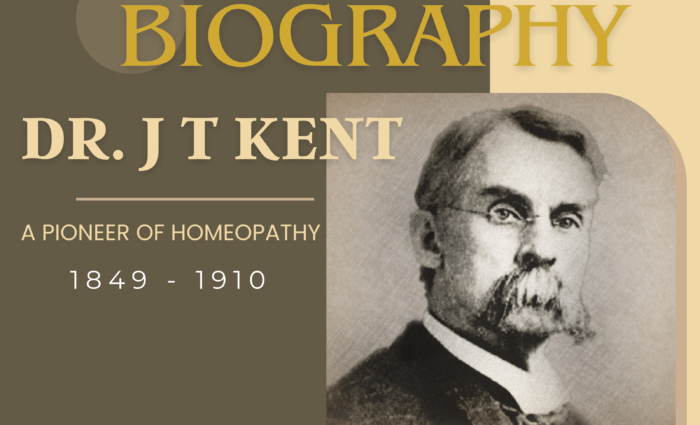Introduction
Table of Contents
ToggleHomeopathy has evolved significantly over the years, thanks to the pioneering efforts of visionary practitioners. One such luminary is Dr. James Tyler Kent (J.T. Kent), whose groundbreaking contributions to materia medica, philosophy, and repertory have shaped modern homeopathic practices. His work remains a cornerstone of homeopathy, influencing generations of practitioners worldwide. Dr. Tanu Raghava, a dedicated homeopathic physician and nutritional counselor, follows the principles laid down by pioneers like Dr. Kent to provide holistic and effective patient care.
Early Life and Education
Born on March 31, 1849, in Woodhull, New York, Dr. J.T. Kent embarked on his medical journey by graduating from the Eclectic Medical Institute in Cincinnati, Ohio, in 1871. Initially trained as an allopathic physician, he transitioned to homeopathy after witnessing a remarkable cure that defied conventional medical treatment. This life-changing event led him to dedicate his career to advancing homeopathic medicine.
Kent’s early exposure to various medical systems, including eclectic medicine, allowed him to develop a broad understanding of different healing methodologies. However, it was homeopathy that truly resonated with him due to its holistic approach to patient care. His curiosity and dedication led him to study homeopathic philosophy deeply, and he soon became a leading advocate of this system of medicine.
Major Contributions to Homeopathy
Dr. Kent’s extensive contributions have left an indelible mark on homeopathy. His work continues to guide practitioners in providing personalized and effective treatments. Below are some of his most significant contributions:
1. Kent’s Repertory of the Homeopathic Materia Medica
One of Dr. Kent’s most celebrated works is his “Repertory of the Homeopathic Materia Medica”, an essential tool that revolutionized homeopathic prescribing. This repertory organizes symptoms systematically, helping homeopaths select the most suitable remedy efficiently. Kent introduced the concept of grading symptoms based on intensity, making the repertory a more precise and effective tool for clinical practice.
His repertory categorized symptoms into different sections, such as general symptoms, mind symptoms, and particular symptoms. This detailed classification made it easier for practitioners to analyze cases and find the most appropriate remedy for their patients. Even today, Kent’s Repertory serves as a crucial reference for homeopaths around the world.
2. Kent’s Materia Medica
Dr. Kent’s “Lectures on Homeopathic Materia Medica” is another masterpiece that remains relevant to this day. His descriptions of remedies provide deep insights into the mental, emotional, and physical characteristics of homeopathic medicines. His work extends beyond listing symptoms, offering a holistic view of remedies based on a patient’s constitution and personality traits.
Kent believed that remedies should not be prescribed solely based on physical symptoms but should also consider the patient’s mental and emotional state. His materia medica emphasizes the connection between the mind and body, making it a valuable resource for homeopaths who practice constitutional treatment.
3. The Philosophy of Homeopathy and Vital Force
Dr. Kent emphasized the importance of the ‘vital force’, an intrinsic energy responsible for maintaining health and harmony within the body. He believed that disease arises when this vital force is disturbed, making homeopathy a means to restore balance rather than merely treating symptoms. His philosophy aligns with the modern holistic approach, which considers the mind, body, and spirit in treatment.
Kent was heavily influenced by the teachings of Dr. Samuel Hahnemann, the founder of homeopathy. He expanded upon Hahnemann’s ideas and integrated them into his own practice. He advocated for treating the root cause of diseases rather than just suppressing symptoms. This approach ensures long-term healing and prevents recurrence of illnesses.
Kent’s Influence on Modern Homeopathy
Dr. Kent’s teachings laid the foundation for classical homeopathy, which remains a widely practiced approach. His principles emphasize individualized treatment, considering every patient’s unique constitution. His methodologies continue to inspire homeopaths, including Dr. Tanu Raghava, who integrates classical homeopathy with modern nutritional approaches to offer comprehensive healing solutions.
Many modern homeopaths continue to use Kent’s principles to refine their case-taking techniques and repertorization methods. His influence is evident in homeopathic education, as his books and lectures are still widely studied in homeopathic colleges worldwide.
Other Notable Contributions
Apart from his major works, Dr. Kent made several other contributions that have significantly influenced homeopathy:
- Hierarchy of Symptoms: He introduced a hierarchy for analyzing symptoms, placing mental symptoms at the top, followed by general symptoms, and lastly, particular symptoms.
- Miasmatic Theory Expansion: Kent expanded on Hahnemann’s miasm theory and emphasized the role of chronic miasms in disease manifestation.
- Clinical Case Studies: His extensive case studies and practical applications of homeopathy provided valuable insights into homeopathic prescribing.
- Teaching and Training: As a professor at the Postgraduate School of Homeopathy in Philadelphia, he trained many future leaders in homeopathy.
The Lasting Legacy of Dr. J.T. Kent
Dr. Kent’s profound impact on homeopathy extends beyond his written works. His students and followers carried forward his methodologies, ensuring his teachings remain fundamental to homeopathic education worldwide. His books and repertories are still widely studied by homeopathy students and practitioners across the globe.
Kent’s philosophy of treating patients holistically and focusing on constitutional treatment continues to shape modern homeopathy. His works serve as a guide for practitioners striving to achieve deep and lasting healing in their patients.

Conclusion
Dr. James Tyler Kent was a visionary whose contributions transformed homeopathy into a more structured and effective medical science. His advancements in repertory, materia medica, and homeopathic philosophy continue to shape modern practices. Inspired by his legacy, modern practitioners like Dr. Tanu Raghava uphold the principles of holistic healing and individualized treatment, ensuring homeopathy’s continued success for future generations.





